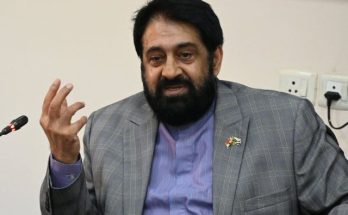John Zubrzycki, an Australian journalist, has authored a finely-nuanced portrait of Mukarram Jah, the last Nizam of Hyderabad. The book conjures up the life and times of a fabulously wealthy man, the heir to a centuries-old tradition, but who ended up being a lonely, tragic figure due to his failure to adapt to changing times. Jah inherited the wealth of his grandfather Osman Ali Shah, the 7th Nizam of Hyderabad, but found his temperament unfitted for the chores of governance. He wanted to get away from it all in India, and moved to Australia in the early seventies where he bought a half-a-million acre estate and lived as a sheep farmer.

In this conversation with Manish Chand, Zubrzycki offers fresh insights into the mindscape of “The ‘Last Nizam” who now lives as a recluse in Turkey, his eclectic narrative method that blends history and biography to map put the life and times of the last dynast of Hyderabad who remains mired in the bog of much myth-making and fantasy.
(Excerpts from the interview):
Q) The life and times of the Nizams of Hyderabad has been much written about. There is a lot of archival material about the last Nizam. What drew you to Mukaram Jah as a subject for your book?
A) It’s a story tailor-made for an Australian and Indian audience. He was made the 8th and last Nizam of Hyderabad in 1967. But by 1972, he was living as a sheep farmer in Australia. He bought a massive property – around half a million acres of land in a remote part of Western Australia. He had inherited his grandfather’s wealth – one of the wealthiest man in the world. But rather than stay in India and manage the estate, he spent a very little time in India as he did not feel very comfortable in India, with all that pressure from aggrieved relatives and Indian tax officials. Then, Indira Gandhi abolished the privy purse. He wanted to get away from it all.
 Q) How did you piece together the Nizam’s life? What was your narrative method?
Q) How did you piece together the Nizam’s life? What was your narrative method?
A It’s a research-based book, not a fictionalized portrait. It’s based on extensive research. I met Mukarram Jah many a time. And I met his friends and some of his detractors. For my book, I went back to the place he was born in 1933. I went back to the archives, looked at his school records, press clippings of the time. This is how I was able to piece together the narrative of his life.
Q) What fresh insights did you gain into his life while writing this book?
A) Well, he was a rather sad character, in a way. He didn’t feel comfortable looking after the last estate…which was worth millions of dollars worth of jewellery, forts and palaces. He told me he wasn’t trained to be an administrator; he went to Cambridge and Sandhurst. At one point, he wanted to join the Indian Army…
Q) Would you call him a tragic figure? What was his tragic flaw?
A) He is a lonely man. He never had many friends. He didn’t know whom to trust and he ended up trusting the wrong sort of people. He thought he could trust Australians. He had some unfortunate marriages… there is tragedy there. He is indeed a lonely man and felt he was not understood well.
Q) What’s your next book about?
A) It’s called The Mysterious Mr Jacob. And yes, it has an India connection as well…
Q) What kind of response your book has got so far?
A) The reception has been much better in India than in Australia because he is much better known in India.
Q) What’s the relevance of the Nizam’s life for contemporary, democratic India? He seems to be a remnant of the past…
A) Some of the Indian royal families grasped the opportunity and made the best of it. He was one of those who could, but didn’t.
Q) He was the one who lost out….
A) Yes, he could not adapt.
Author Profile
- India Writes Network (www.indiawrites.org) is an emerging think tank and a media-publishing company focused on international affairs & the India Story. Centre for Global India Insights is the research arm of India Writes Network. To subscribe to India and the World, write to editor@indiawrites.org. A venture of TGII Media Private Limited, a leading media, publishing and consultancy company, IWN has carved a niche for balanced and exhaustive reporting and analysis of international affairs. Eminent personalities, politicians, diplomats, authors, strategy gurus and news-makers have contributed to India Writes Network, as also “India and the World,” a magazine focused on global affairs.
Latest entries
 DiplomacyJanuary 5, 2026India walks diplomatic tightrope over US operation in Venezuela
DiplomacyJanuary 5, 2026India walks diplomatic tightrope over US operation in Venezuela India and the WorldNovember 26, 2025G20@20: Africa’s Moment – The Once and Future World Order
India and the WorldNovember 26, 2025G20@20: Africa’s Moment – The Once and Future World Order DiplomacyOctober 4, 2025UNGA Resolution 2758 Must Not Be Distorted, One-China Principle Brooks No Challenge
DiplomacyOctober 4, 2025UNGA Resolution 2758 Must Not Be Distorted, One-China Principle Brooks No Challenge India and the WorldJuly 26, 2025MPs, diplomats laud Operation Sindoor, call for national unity to combat Pakistan-sponsored terror
India and the WorldJuly 26, 2025MPs, diplomats laud Operation Sindoor, call for national unity to combat Pakistan-sponsored terror







